|
|
|
Sort Order |
|
|
|
Items / Page
|
|
|
|
|
|
|
| Srl | Item |
| 1 |
ID:
113517
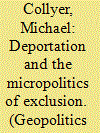

|
|
|
|
|
| Publication |
2012.
|
| Summary/Abstract |
The forced removal of foreign nationals has been a relatively uncommon occurrence in liberal democracies, at least since the 2nd World War. This can be explained by both the inherent violence of this process, which raises widespread public opposition, and by the geopolitical difficulties it raises, as there must be agreement of both countries concerned. In recent years these problems appear to have been partially overcome and since 2005 a 'deportation turn' is evident across the European Union as deportations increase. This paper focuses on the international dimension to this increase, following work investigating deportation as an essentially biopolitical process of international governance of populations. This approach is developed in an analysis of the geopolitical impacts of that management process. The paper uses empirical research with Sri Lankan migrants who left the UK either as a result of force or voluntary returns policies to explain this development. It identifies the changing strategy of the deportation process, particularly recent attention to the negotiation of bilateral and multilateral readmission agreements and the role of international organisations as mediators as key contributions to an explanation for the rise in deportations.
|
|
|
|
|
|
|
|
|
|
|
|
|
|
|
|
| 2 |
ID:
188927
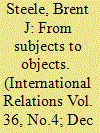

|
|
|
|
|
| Summary/Abstract |
Following the 2004 establishment of the World War II memorial in Washington DC, itself a product of the collective re-commemoration of the so-called ‘Greatest Generation’ of WWII veterans in the US, nonprofit organizations began the practice of ‘Honor flights’. These flights transported US veterans of the Second World War to Washington DC to visit that memorial and other commemorative sites, meet with Congressional members, and return to their local airports to great fanfare and celebration. The practice has evolved to incorporate Korean War and now Vietnam War veterans. As honor flights include much more than the veterans themselves, and as it has become an affectively charged festival for local communities to ‘honor’ their veterans during periods of unresolved wartimes, I articulate the Honor Flight as a treatment for – but also a symptom of – US ontological insecurity in the 21st Century. Honor flights are celebratory, judgmental, and political micro-practices that reflect and reproduce US militarism in ways that will likely outlast the wartimes of the 21st century United States. Along with other micro-practices of US ontological (in)security, Honor Flights threaten to destabilize the politics of military intervention hereafter, and encourage the extension of or inauguration of new times of war.
|
|
|
|
|
|
|
|
|
|
|
|
|
|
|
|
| 3 |
ID:
071964
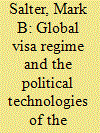

|
|
|
|
|
| Publication |
2006.
|
| Summary/Abstract |
This article examines the micropolitics of the border by tracing the interface between government and individual body. In the first act of confession before the vanguard of governmental machinery, the border examination is crucial to both the operation of the global mobility regime and of sovereign power. The visa and passport systems are tickets that allow temporary and permanent membership in the community, and the border represents the limit of the community. The nascent global mobility regime through passport, visa, and frontier formalities manage an international population through and within a biopolitical frame and a confessionary complex that creates bodies that understand themselves to be international. The author charts the way that an international biopolitical order is constructed through the creation, classification, and contention of a surveillance regime and an international political technology of the individual that is driven by the globalization of a documentary, biometric, and confessionary regime. The global visa regime and international borders are crucial in constructing both international mobile populations and international mobile individuals.
|
|
|
|
|
|
|
|
|
|
|
|
|
|
|
|
| 4 |
ID:
057996
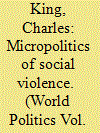

|
|
|
| 5 |
ID:
076164
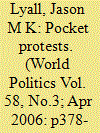

|
|
|
| 6 |
ID:
152108
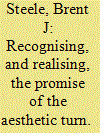

|
|
|
|
|
| Summary/Abstract |
Roland Bleiker’s iconic and courageous mapping of the aesthetic turn in international political theory called attention to one very basic but up until then unstated maxim: that the ‘inevitable difference between the represented and its representation is the very location of politics’.1 Exactly. Thanks to this insight, the aesthetic turn revealed a kind of vulnerability of states – and of great powers in particular – that had not previously been seen. This ‘aesthetic vulnerability’ brought to light states’ concern with their own representation and self-representation, with the way they ‘look’ in their own eyes and in the eyes of others. This soft underbelly of power politics acquired particular urgency after 9/11, as the hyper-visuality of the event – and its violent aftermath – so evidently pointed at that ‘representational gap’. The ‘aesthetic vulnerability’ of the United States called attention to its representational practices and, simultaneously, opened political spaces to challenge its policies. However, as the never-ending ‘War on Terror’ mutates into ‘global Trumpism’, the limits of this near-exclusive focus on the United States and the West are becoming more evident, demanding consultation of new perspectives and new terrains for ‘aesthetic’ engagements in, and of, critical IR.
|
|
|
|
|
|
|
|
|
|
|
|
|
|
|
|
| 7 |
ID:
188244
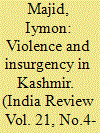

|
|
|
|
|
| Summary/Abstract |
One of the longest-surviving insurgent groups fighting the Indian state in the disputed region of Jammu and Kashmir is Hizb ul Mujahedeen. It has been linked with the Kashmiri offshoot of the Islamist organization Jama’at e Islami and has been called its armed wing. By looking at the degree of involvement of Jama’at e Islami in the Kashmir insurgency and its relationship with Hizb, the article focuses on existing organization structures. Existing structures affect the effectiveness of the insurgent group. More specifically, the paper inverts the focus from Jama’at e Islami as the political front of Hizb ul Mujahedeen and argues that the latter, in a clear understanding of the ‘micropolitics of rebellion,’ used the former to organize themselves. This article also investigates the militantization of Jama’at e Islami – a perception that its political program is inherently violent – because of its association with the insurgency.
|
|
|
|
|
|
|
|
|
|
|
|
|
|
|
|
| 8 |
ID:
114113
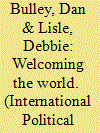

|
|
|
|
|
| Publication |
2012.
|
| Summary/Abstract |
London's successful bid for the 2012 Olympic Games presented a diverse, cosmopolitan city opening its arms and "welcoming the world." This article explores the apparently benign gesture of hospitality contained in London's official candidature files submitted in 2004 and asks how such a promise of inclusiveness is managed. We argue that London's depiction of itself as hospitable to every kind of visitor relies on subtle techniques of governmentality in which the subject positions of "host" and "guest" are imagined and produced in ways that make them more governable. By this, we are not referring to acts of authority, coercion, or discipline that exclude subjects or render them docile bodies within a rigid panoptical city. Rather, we are referring to the delicate ways in which the official bid document imagines and produces the ideal subject positions of host and guest and in so doing enables, encourages, and incentivizes certain behaviors. This analysis of urban welcoming takes us beyond reductive oppositions of hospitality and hostility, inclusion and exclusion, self and other. It focuses instead on how London's inclusive welcome produces a variety of host and guest positions (for example, the "Olympic Family," volunteers, guest workers), segregates them within the city, and then "conducts their conduct" in the areas of planning, security, transport, accommodation, education, and training. By analyzing the techniques of governmentality at work in London's 2004 bid document, this article foregrounds the enabling form of power driving the city's inclusive welcome and exposes its inherent micropolitics.
|
|
|
|
|
|
|
|
|
|
|
|
|
|
|
|
|
|
|
|
|